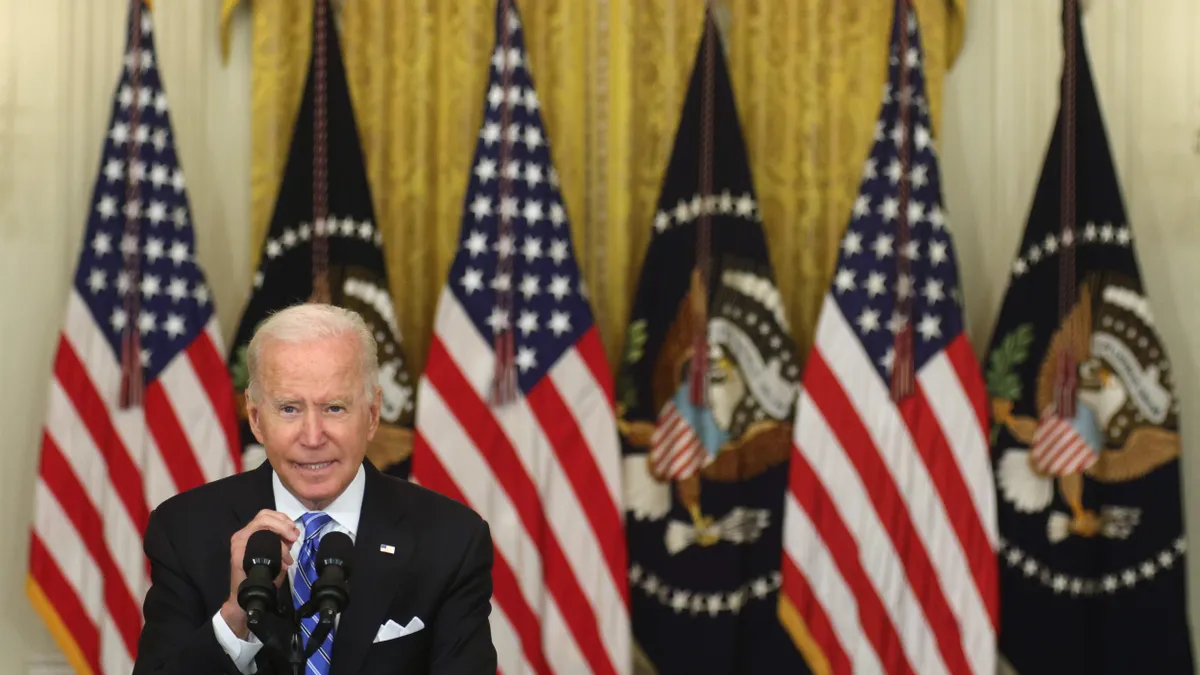Dive Brief:
- The U.S. Department of Labor's Occupational Safety and Health Administration is developing a rule implementing a new temporary emergency standard requiring all employers with more than 100 employees to ensure their workforces are fully vaccinated against COVID-19, or require any unvaccinated workers to have a negative test result weekly before coming into work, according to a White House statement.
- Separately, President Joe Biden was preparing Thursday to sign an executive order requiring all federal executive branch workers to get vaccinated, and this standard would be extended to employees of contractors that do business with the federal government.
- OSHA's temporary standard also will require covered employers to provide paid time off for the time it takes workers to get vaccinated, or to recover from post-vaccination side effects, the White House said.
Dive Insight:
Representatives from several higher education associations were waiting for more details on the mandates, particularly the OSHA rules, they said Friday. But it appears that many colleges will be affected.
Those that receive funding as a contractor of the federal government — such as those managing federal laboratories — would be covered by the vaccine mandate for employees of contractors that do business with the federal government, they said. Private colleges and universities with 100 or more workers are covered by the requirement that those employers mandate vaccination or weekly testing, according to the National Association of College and University Business Officers.
But the National Association of Independent Colleges and Universities is waiting for more details around issues, including whether work-study students will count as employees, a spokesperson said in an email. Another unresolved issue is how the requirements would be applied to colleges in states that have banned vaccine mandates.
Many but not all colleges have required vaccines this fall. More than 1,000 institutions already have vaccination requirements in place, according to an American Council on Education spokesperson.
The Biden administration's latest push to get workers vaccinated follows a series of appeals to those who are unvaccinated.
The Food and Drug Administration's approval of the two-dose mRNA vaccine produced by Pfizer and BioNTech gave many employers confidence to implement mandates. After an Aug. 24 press briefing in which he cited the FDA's decision as a sign that "now is the time" for businesses and other entities to require vaccination, Biden once again referenced the agency's approval during a televised address Thursday evening.
"My message to unvaccinated Americans is this: what more is there to wait for? What more do you need to see?," he said. "We've been patient, but our patience is wearing thin, and your refusal has cost all of us."
The share of Americans who have received at least one dose of a COVID-19 vaccine topped 61% last week, according to research organization Our World in Data.
"Many of us are frustrated with the nearly 80 million Americans who are still not vaccinated even though the vaccine is safe, effective and free," Biden said Thursday. "In a country as large as ours, that's [a] 25% minority. That 25% can cause a lot of damage, and they are."
A number of employers that would presumably be covered by the rule outlined by the White House have already implemented mandates. The list includes Tyson Foods, Microsoft and Walmart, among others. Similarly, job postings requiring vaccination against COVID-19 increased by 34% on recruiting service Indeed between the first weeks of July and August.
Consulting firm Willis Towers Watson found in a mid-August survey of 961 employers that more than half could have some type of vaccination requirement in place by the end of 2021's fourth quarter.
But not all employers or industries have universally moved to adopt mandates. A report last month by law firm Littler Mendelson found that those in the manufacturing, retail and hospitality industries were least likely to require COVID-19 vaccines, with common concerns including resistance from employees, loss of staff and impacts on culture and morale.
There also may be concerns about the need to accommodate employees who are unable to receive a vaccination, whether due to a medical condition or sincerely-held religious belief. "A DOL rule, if issued, would almost certainly affirm that employers must accommodate employees who refuse to be vaccinated based on disability or a sincerely held religious belief," Paula Ketcham, partner at Schiff Hardin, told HR Dive in an email.
Higher Ed Dive Senior Editor Rick Seltzer contributed to this story.















